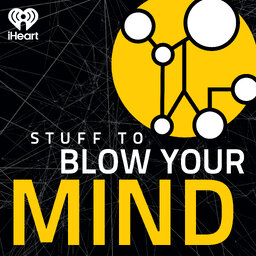The Whistling, Part 4
In this episode of Stuff to Blow Your Mind, Robert and Joe discuss the nature and history of human whistling – including the subject of whistled languages.
In 1 playlist(s)
Stuff To Blow Your Mind
Deep in the back of your mind, you’ve always had the feeling that there’s something strange about re…Social links
Follow podcast
Recent clips

Crab Bag, Part 3: The Crab is a Lonely Hunter
55:55

Weirdhouse Cinema Rewind: La Loba (1965)
1:30:07

From the Vault: Mystery Cults, Part 4
1:00:23
 Stuff To Blow Your Mind
Stuff To Blow Your Mind